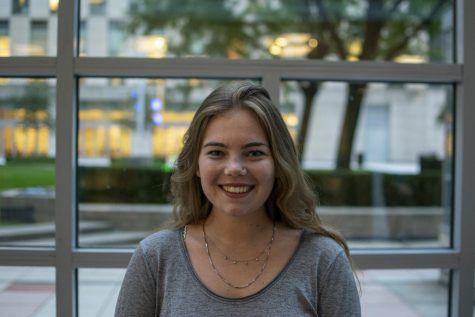UPDATED: Students For Justice in Palestine Win Historic Lawsuit
August 10, 2019
https://www.instagram.com/p/B00_J9NgqGn
For over two years, five Fordham students have waged a legal battle against Fordham University to establish a Students for Justice in Palestine (SJP) chapter at the Lincoln Center campus. On Aug. 5, the students landed a victory in court when Justice Nancy Bannon annulled the university’s decision to overrule United Students Government (USG) vote to grant club status to SJP.
SJP faced resistance from the university to attain full club rights and privileges since they first submitted paperwork for club status in November 2015. In December 2016, Keith Eldredge, dean of students, said that the group’s presence on campus would be “polarizing,” and made a final decision to permanently ban the group. It was the first time a dean had overruled a USG decision.
The university’s decision resulted in The Foundation for Individual Rights in Education (FIRE) listing Fordham University as one of the 10 Worst Colleges for Free Speech in 2017. Students protested the decision on the Lincoln Center campus even spilling out onto public streets. Following that, dozens of faculty, alumni and civic justice organizations wrote an open letter to the university expressing their support for SJP.
In April 2017, Ahmad Awad, Fordham College at Lincoln Center (FCLC) ’17, Sofia Dadap, FCLC ’18, Sapphira Lurie, FCLC ’17, and Julie Norris, FCLC ’19, represented by cooperating counsel Alan Levine, as well as the organizations Palestine Legal and the Center for Constitutional Rights, filed a lawsuit against the University in an effort to get the club recognized.
In February 2019, two years after the initial case filing and with only one of the original four members still a student at Fordham, Veer Sheety, FCLC ’21, also joined the lawsuit.
After a lengthy legal battle, Judge Bannon has ruled in favor of establishing an SJP chapter at FCLC. “The consideration and discussion of differing views is actually part of Fordham’s mission, regardless of whether that consideration and discussion might discomfort some and polarize others,” wrote Bannon.
At a public university, the decision to deny SJP’s club status would be seen as a violation of the First Amendment. As a private institution, Fordham tried to argue in court that it was not obliged to follow the orders. “There’s no First Amendment right at a private university. There just isn’t. The law is very clear,” said Jim Ryan, an attorney for Fordham, in court.
However, regardless of the First Amendment, Bannon made note of Fordham’s commitments to free speech and expression in its mission statement and demonstration policy.
Bannon also said that Fordham University’s “disapproval of SJP was made in large part because the subject of SJP’s criticism is the State of Israel, rather than some other nation, in spite of the fact that SJP advocates only legal, nonviolent tactics aimed at changing Israel policies.”
Eldredge originally said that the group’s support of Boycott, Divestment and Sanctions (BDS) would “present a barrier to open dialogue,” as reasoning for his decision in December 2016.
However, many activists see this increased restrictions on pro-Palestinian advocacy as “the Palestinian exception” to free speech. Critics have pointed to occasions when the university has upheld its commitment to free speech for other parties on campus.
In 2012, when College Republicans invited Ann Coulter to speak at Fordham, a petition calling for the administration to ban Coulter from speaking began circulating the campus. Reverend Joseph M. McShane, S.J., university president, wrote in a university-wide email that “preventing Ms. Coulter from speaking would counter one wrong with another,” and, “I fully expect our students, faculty, alumni, parents, and staff to voice their opposition, civilly and respectfully, and forcefully.”
Awad, et al. v. Fordham University is the first lawsuit in the country that challenged censorship of students advocating for Palestinian rights. The SJP victory came only a day before Rep. Doug Collins, ranking Republican of the House Judiciary Committee, announced the reintroduction of The Anti-Semitism Awareness Act. In 2018, Palestine Legal published a legal letter saying that the act’s “real purpose is to silence campus advocacy for Palestinian rights and to censor criticism of Israeli government policies.”
News of this case stands as a departure from many of the national headlines surrounding U.S. interests in Israeli-Palestinian affairs. In recent years, individuals around the country who advocate for Palestinian rights, in many cases university students, have faced accusations of being “anti-semitic” and “enemies of Israel and the United States.”
In recent months, many Muslim Americans and Palestinian advocates have been labeled as “radical” or “anti-Israel,” and have been wrongly connected to Islamic terrorist organizations by far-right policy groups, politicians and media outlets. Since SJP’s court filing, all four original plaintiffs have been listed on the website of The Canary Mission, an organization that identifies people and groups that “promote the hatred of the USA, Israel, and Jews on North American college campuses.” The website lists over 2,000 people in total that they deem as “anti-Jewish,” including some Fordham faculty, on their website.
In a statement from the university on Aug. 8, Bob Howe, assistant vice president for communications, reiterated Fordham’s commitment to its students and their interests, inside and outside of the classroom.
“The University is reviewing the court’s decision before deciding on a way forward,” said Howe. The university did not offer a timeframe or how it plans to implement the ruling.
This article was updated with additional details about the case’s history on Aug. 24, 2019.










